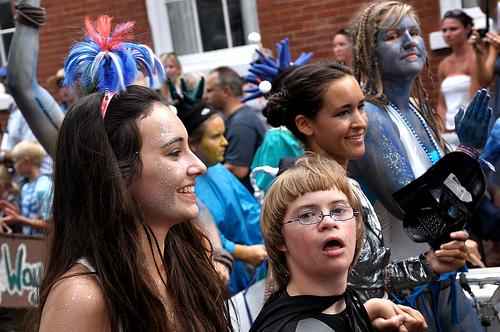Camp Jabberwocky: Disability rights through community building
Photograph of Jabberwocky campers and councelors in July 4th parade (Image by Flickr user WBUR (by:cc))
This story was originally covered by PRI’s Here and Now. For more, listen to the audio above.
On 14 acres of Martha’s Vineyard sits a camp for a diverse group of people with disabilities. Camp director, Johanna Romero de Slavy, or JoJo, describes the attendance as everyone “from your autistic who can’t handle screaming noise — and we’re a very loud crowd — to a wheelchair quadriplegic who may need help with a bowel program [and] people who aspirate who have to truly be watched when eating. So, it’s a big spectrum.”
The camp was started in 1952, and offers activities including horseback riding, jet skiing, parasailing, arts and crafts, baseball and basketball. Volunteer counselors provide one-on-one aid to the adults and children who come for community and recreation.
Campers like Mary Beth Rush are able to experience activities such as kayaking, that without the proper equipment, she may never have tried. “It was amazing,” Rush says about her first time in a kayak. “I mean, just so cool to be in the water like that, without my wheelchair and like paddle and stuff. I’ve always seen my mom and her friends always go in the kayaks, and I’ve always wondered, you know, ‘what’s it like?’ And it kind of makes you feel free.”
Camp Jabberwocky’s presence is important to the surrounding community. According to Romero de Slavy, the camp’s initial intention was to stop children with disabilities from being hidden. She describes what happens once those kids are a part of the community: “when you see a young counselor taking care of them, a lot of people think they’re family, and then they realize, ‘oh this is a kid who volunteered their entire summer to take care of someone with a disability.’ Eyes start to open, I think.”
For 96-year-old founder Helen Lamb, who still starts every season by reading C.S. Lewis’ poem, “The Jabberwocky” to the camp, and made a surprise visit to the camp’s float in the Edgartown Independence Day parade, disability rights still need to be fought for. “I have been into many houses, and even today, they have a special room for them, and they spend mornings, afternoons, evenings, nights in that room. And that’s what I used to want to stop.”
———————————————————————————
“Here and Now” is an essential midday news magazine for those who want the latest news and expanded conversation on today’s hot-button topics: public affairs, foreign policy, science and technology, the arts and more. More “Here and Now”.
We want to hear your feedback so we can keep improving our website, theworld.org. Please fill out this quick survey and let us know your thoughts (your answers will be anonymous). Thanks for your time!
